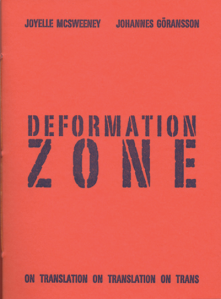Deformation Zone by Joyelle McSweeney and Johannes Göransson
 Deformation Zone (2012) is an online chapbook collection of two essays released by Ugly Duckling Presse, co-written by spouses and separately poetic geniuses, Joyelle McSweeney and Johannes Göransson. The essays center on translation, and while they discuss the matter separately, the message is clear: translation is Frankenstein’s monster covered in stitches, a mutated child pieced together in the womb of language and born by the translator.
Deformation Zone (2012) is an online chapbook collection of two essays released by Ugly Duckling Presse, co-written by spouses and separately poetic geniuses, Joyelle McSweeney and Johannes Göransson. The essays center on translation, and while they discuss the matter separately, the message is clear: translation is Frankenstein’s monster covered in stitches, a mutated child pieced together in the womb of language and born by the translator.
The first piece is written by Göransson, who lived in Sweden until the age of thirteen before moving to America. Göransson discusses the lesion that is left from translating the self in his essay, “Translation Wounds.” Something notable about Göransson’s translations is that his words are always juxtaposed on a mated page (at least in the two books I have read). We never witness his work without the original keeping close watch, a deliberate move in relation to this leaking wound. The joint between the original work and the translation is severed, and here is where the wound breeds.
Using particular examples from his own translations of Transfer Fat by fellow Swede Aase Berg, Göransson displays the impossibility and futility of translation. In the poem “öppna Väljaren” (“Open the Voter” in English), a key word, “val,” which has three meanings in Swedish, is used and played with repeatedly; but because we have nothing like this in English, the word simply becomes “whale” over and over again. The intention and cleverness of the poet has been lost through this conversion, which feeds into the idea of this spreading injury inflicted on the page. Göransson leaves us with these haunting words:
In our American poetry, translation is mostly seen as the antithesis of poetry, an impossible obstacle, something that one must but can’t overcome. But there are poetry and translation projects that are interested in this ghostly séance space of corpses and wounds. These are projects that are born to lose, that make a home there, that make a text there, that stoke the wound, that stoke in it; made from doubt, they put a finger in it; faint, of failing health, they have their blood drawn, they are drawn to the (blood) loss of translation.
McSweeney navigates her ekphrastic essay “Translation, the Slavish Mould, the Filthiest Medium Alive: With Special Reference to Matthew Barney, Andy Warhol, and Divine” through a different yet similar tributary to Göransson, opting for the physical translation of multimedia projects, or the transformation of a work of art into a different work of art; for instance, turning a painting into sculpture and rendering that sculpture into film and so on.
These acts of translation throw the medium’s limits radically into question, disorienting our sense of where if anywhere the borders of film, painting, sculpture, and literature might lie.
McSweeney’s artistic pop culture references and use of photographic figures give the reader a highly interactive approach to this multifarious text.
McSweeney lists two ways to translate: masterfully or slavishly. Slavishness is a spore in the text that diverges and grows. The word slavish is defined as both deliberately imitative and lacking originality. A type of common sense is required to achieve transparency according to her. The text then dips into the art-star mould, the creation of moulds and their impossibility to fill or sustain. The constant translations from one medium to another break any mould that could encase such art.
There is no natural body in Barney’s work, because the body is always revealing itself to be prosthetic, a set for evisceration or dismemberment, a sculpture, a tool, a medium for media. An this super-saturated mediumicity often reveals itself as a wounding of the body, an opening, a ripping away.
In both of these essays a physicality of translation exists wounding in nature. To translate is to birth a monster, to lose solid footing, and to shoot oneself.
Deformation Zone is available for free from Ugly Duckling Presse
Liz McGehee is an MFA candidate at the University of Colorado Boulder.